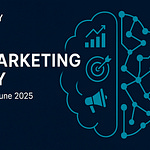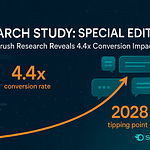Today's briefing uncovers how AI is reshaping marketing strategies through automation, personalisation and real-time optimisation. Discover how Swedish fintech Klarna's recent AI experiment backfired, Microsoft's coder layoffs reveal AI's growing impact, and why AI-driven governance is becoming essential for marketing teams.
Story #1: Klarna Replaces Marketing Team with AI, Then Quickly Reverses Course
Source: MarTech (published May 15, 2025)
URL: https://martech.org/the-latest-ai-powered-martech-news-and-releases/the-latest-ai-powered-martech-news-and-releases/
What Happened: Swedish fintech giant Klarna conducted a bold experiment by completely replacing its marketing team with AI systems, only to discover the strategy was significantly underperforming. The company is now urgently seeking to rehire human marketers after determining that AI-driven marketing produced underwhelming results.
Why It Matters: This case provides valuable real-world evidence about the current limitations of fully automated marketing. Despite impressive advances in AI marketing tools, the experiment demonstrates that human creativity, strategic thinking, and contextual understanding remain essential for effective marketing campaigns.
Suggested Actions:
Audit your current AI marketing tools to identify areas where human oversight is crucial rather than adopting a complete automation approach
Develop a balanced human-AI collaboration strategy that leverages the strengths of both
Story #2: Microsoft Layoffs Hit Coders Hardest as AI Generates Up to 30% of Code
Source: TechCrunch (published May 15, 2025)
URL: https://techcrunch.com/2025/05/15/programmers-bore-the-brunt-of-microsofts-layoffs-in-its-home-state-as-ai-writes-up-to-30-of-its-code/
What Happened: Microsoft's recent 2,000-person layoff in Washington state disproportionately affected software engineers, with over 40% of the cuts targeting coding positions. Bloomberg analysis reveals the layoffs hit programming jobs far harder than sales or marketing roles, suggesting AI code generation capabilities may be replacing human programmers.
Why It Matters: This shift foreshadows changes that could affect marketing technology teams, as AI increasingly handles technical tasks previously requiring specialised human skills. For marketers, it signals the growing importance of focusing on strategic rather than purely technical skills.
Suggested Actions:
Invest in upskilling marketing technology teams to focus on AI oversight, customisation, and strategic implementation
Evaluate which technical marketing roles might be vulnerable to AI automation and develop transition plans
Story #3: Backlinko Updates "Best AI SEO Tools for 2025" List with New Entries
Source: Backlinko (published May 15, 2025)
URL: https://backlinko.com/ai-seo-tools
What Happened: Backlinko has published an updated comprehensive guide to AI SEO tools, highlighting eight essential platforms for marketers in 2025. The freshly updated guide covers everything from ChatGPT's advanced SEO applications to specialised tools like MarketMuse, Frase, and Shopify Magic, providing tactical insights for implementation.
Why It Matters: With Google's AI Overviews now appearing in over 13% of searches (up 102% in just two months according to recent Semrush data), marketers need specialised AI tools to maintain visibility. This guide offers a curated selection of tools that can help marketers adapt to the rapidly evolving search landscape.
Suggested Actions:
Evaluate the recommended AI SEO tools against your current stack to identify potential gaps
Test the AI-driven content optimisation features highlighted in the guide to improve organic visibility
Story #4: Google Adds New AI Accessibility Features to Android and Chrome
Source: TechCrunch (published May 15, 2025)
URL: https://techcrunch.com/2025/05/15/google-rolls-out-new-ai-and-accessibility-features-to-android-and-chrome/
What Happened: Google has launched significant AI-powered accessibility enhancements for Android and Chrome. The most notable addition is an upgraded TalkBack screen reader that now allows users to ask Gemini to describe images or explain on-screen content, making digital content more accessible to visually impaired users.
Why It Matters: These developments highlight the growing importance of accessibility in digital marketing. As AI makes accessibility features more powerful and prevalent, marketers need to ensure their content is optimised for these new interaction methods or risk excluding significant audience segments.
Suggested Actions:
Review your marketing content for compatibility with AI-powered accessibility tools
Include accessibility considerations as part of your standard content creation workflow
Story #5: New Expectations Are Redefining Brand Loyalty in 2025
Source: MarTech (published May 15, 2025)
URL: https://martech.org/2025-will-redefine-loyalty-heres-what-that-means-for-brands/
What Happened: A new report released yesterday reveals that consumer expectations around brand loyalty are undergoing significant transformation in 2025. The research identifies emerging patterns around transparency, values-alignment, and real-time relevance that are reshaping how consumers decide which brands deserve their continued business.
Why It Matters: This shift fundamentally challenges traditional loyalty programmes and retention strategies. As consumers increasingly prioritise authentic brand values and real-time personalisation, marketing teams need to evolve their approach to customer retention beyond transactional rewards to building genuine, values-based relationships.
Suggested Actions:
Audit your current loyalty strategies against the new expectations around transparency and values-alignment
Implement more responsive, real-time personalisation systems that adapt to customer context
Comprehensive Analysis: The Evolving Relationship Between AI and Marketing in Mid-2025
The stories from May 15th, 2025, highlight a critical inflection point in the relationship between AI and marketing. While AI tools continue to transform the industry with impressive capabilities, we're seeing a more nuanced understanding emerge about their proper implementation and limitations.
Klarna's failed experiment with a fully AI marketing team demonstrates what many industry experts have suspected: current AI systems excel at optimisation, execution and data processing, but still lack the human qualities essential for truly resonating marketing—strategic vision, emotional intelligence, cultural awareness, and creative intuition. This high-profile misstep will likely prompt other organisations to recalibrate their AI adoption strategies to focus on human-AI collaboration rather than replacement.
The Microsoft layoffs present a stark reality check for technical professionals in marketing technology. As AI code generation capabilities reach a point where they can produce up to 30% of production code, technical roles are evolving rapidly. Marketing teams need to reconsider skill development pathways, potentially prioritising prompt engineering, AI oversight, and strategic implementation over traditional coding skills.
The updated AI SEO tools guide from Backlinko reflects the urgency of adapting to an increasingly AI-dominated search landscape. With Google's AI Overviews now appearing in over 13% of searches and growing rapidly, traditional SEO approaches are being fundamentally challenged. The most successful marketing teams will be those that leverage specialised AI tools to optimise for this new environment whilst maintaining the authentic, expert content that both algorithms and humans value.
Google's accessibility enhancements underscore an often-overlooked aspect of AI in marketing: its potential to make digital content more inclusive. As these tools become standard features rather than specialised add-ons, marketers must incorporate accessibility considerations into their core strategy rather than treating them as an afterthought.
Finally, the research on evolving loyalty expectations reveals how consumer relationships with brands are being fundamentally redefined. The emphasis on transparency, values-alignment, and real-time relevance means marketing teams need to move beyond traditional loyalty programmes based primarily on transactional rewards. Instead, successful customer retention will increasingly depend on authentic brand positioning and contextually relevant experiences delivered at precisely the right moment.
Collectively, these developments suggest that marketing is entering a more mature phase of AI adoption, where the initial hype is giving way to more practical, balanced approaches that recognise both the power and limitations of artificial intelligence in marketing contexts.
Key Takeaways:
Human-AI collaboration works better than AI replacement: Klarna's experiment confirms that optimal results come from combining AI efficiency with human creativity and strategic thinking.
Technical marketing roles are evolving rapidly: As AI handles more coding and technical tasks, marketing technologists should focus on strategic oversight rather than execution.
Specialised AI tools are essential for SEO success: With AI Overviews transforming search results, marketers need purpose-built tools to maintain visibility.
Brand loyalty is being redefined by new consumer expectations: Companies need to move beyond transactional rewards to build authentic, values-based relationships with real-time relevance.
How-To Spotlight: Building Value-Based Loyalty in 2025
Creating stronger loyalty in today's evolving landscape requires a shift from purely transactional approaches to value-based relationships:
Map your brand values to customer priorities: Identify which of your core brand values align with what matters most to your audience, and make these connections explicit in your communications.
Implement real-time contextual relevance: Leverage AI to deliver personalised experiences that respond to:
Current location and situation
Recent brand interactions
Changing preferences or needs
Environmental or social context
Increase transparency in brand practices: Today's consumers expect visibility into:
Sourcing and production methods
Data usage policies
Corporate values and social positions
How algorithms and recommendations work
Measure beyond transactions: Develop metrics that track:
Emotional connection to your brand
Values alignment with customers
Quality of engagement rather than just quantity
Advocacy and community participation
Create community-building opportunities: Foster connections not just between brand and customer but among customers who share similar values and interests.
FREE BETA ACCESS: We've launched our AI for SEO course to help you implement these cutting-edge strategies. Get free access during the beta period at
https://seoaicourse.indexify.co/
COMING SOON: We're also developing a more advanced course for marketers who want to take their AI skills to the next level. Check out our LinkedIn announcement for early details: https://www.linkedin.com/posts/marketing-intelligence_im-putting-together-a-more-advanced-course-activity-7328732998302896130-oZqc
Subscribe to our daily updates:
and listen to our podcast: https://indexify.substack.com/podcast















Share this post